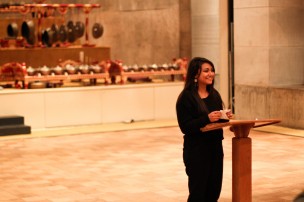
Trisha Arora/Photo Editor
Students gathered on Wednesday, Nov. 20 in the World Music Hall to hear their peers talk about personal experiences with human rights in the Middle East. The event, titled WEStimonials, featured Danny Blinderman ’14, Hazem Fahmy ’17, Carina Caligiuri Kurban ’14, Piril Özince ’16, and Sam Sikder ’14 sharing their experiences with civil liberties. The event was followed by a reception with Middle Eastern cuisine.
WEStimonials was organized primarily by WesAmnesty co-leaders Margaret Curtis ’16 and Joe Ringoen ’14. Ringoen said that the event was designed to present an unbiased point of view on the current state of the Middle East.
“We’re hoping to bring awareness to campus, to get people thinking and dialoguing about issues that are happening on the other side of the world but that effect people on campus,” Ringoen said. “We want to create a positive dialogue around the issue that’s not based in different viewpoints or with student groups, but to try to create as depolitical of an environment as possible so we can discuss these issues without creating tensions.”
Trisha Arora ’16, the event’s social media organizer, also emphasized that the organizers wanted the event to be focused on awareness and experience.
“We wanted it to be more student-oriented as opposed to professors and more of a lecture,” Arora said. “Our main goal was to get students to realize that there are students among us who have encountered human rights issues. We didn’t want this to be a political thing; we wanted it more to be an awareness thing, to see how other students lived in the past and what they’ve experienced.”
Fahmy, who grew up in Egypt, chose to focus his talk on the treatment of the queer community in his home country.
“I feel it’s an extremely serious issue that does not get enough attention in general in the Middle East and the Arab/Islamic world where LGBT rights are, for the most part, pretty horrible,” Fahmy said. “I have a close Egyptian friend who is gay and attempted suicide because of the cultural and legal oppression.”
While in the United States much of the discussion of LGBTQ rights is focused around gay marriage and legal equality, in Egypt, it often centers around personal safety.
“It’s a matter of them being hunted down, being tortured, being accused of wild accusations, just to have a reason to put them in jail,” Fahmy said. “It’s a matter of them being kicked out of their homes by their own families, sometimes being killed by their own family. Tolerance needs to be a priority…. Acceptance and embracing is a long way [away]. Tolerance and a lack of violence against LGBT people is crucial for now.”
Fahmy wanted his talk to give students a more realistic view of both the types and scope of problems that people in the Middle East face.
“I want to give a more legitimate and un-sensationalized view of issues in the Middle East,” Fahmy said. “Most of the time when Middle-Eastern issues pop up in Western news [they’re] very dramatized. I want people to recognize and understand that there is suffering in the Middle East, that it’s not necessarily something that everyone can understand…but it’s relatable suffering; these are universal experiences.”
Arora and Ringoen noted that they hope the event helped open students’ eyes to the diversity at the University and the experiences that all students carry with them.
“People are aware that there are violations going on, but they don’t realize that they know people who might have witnessed them, who might have been a victim,” Ringoen said. “Even at Wesleyan, you walk by people every day that really are affected by these issues halfway around the world. It’s great to get a better awareness of how these issues affect us here and how they travel across borders.”
Blinderman, who shared his experience as a Jewish person visiting Israel, urged the audience not to receive the information passively.
“Don’t take my word for it,” he said. “Read a book; read an article. Go there for yourself. See what you need to see for yourself. Challenge yourself; don’t just go on vacation…. If enough people come and enough people care, it might be possible to save both Israel and Palestine from this slow plummet into oblivion.”
Katie Darr ’17 attended the event and found the accounts both informational and compelling.
“I didn’t know a lot about these issues, so it was very enlightening to hear about them,” Darr said. “People know that there are issues, but I don’t think they know the extent of the issues. So to have a spot where people can hear how big these problems are, it was helpful.”
Rachel Earnhardt ’17, who also attended the event, agreed, adding that the event opened the doors to a wider discussion.
“The issues are so complex that people are resistant to deal with them,” Earnhardt said. “Obviously, we did not find solutions tonight, but it opened a dialogue. This is a start.”